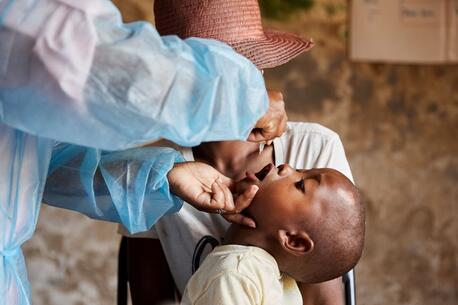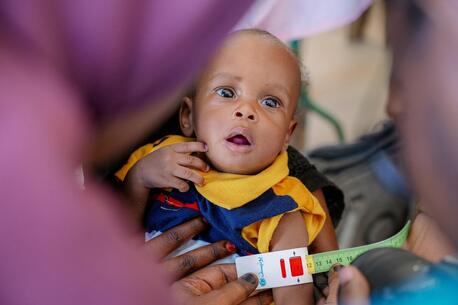
Helping Rohingya Mothers Feed Their Babies
A military crackdown in the northern Rakhine province of Myanmar has driven an estimated 687,000 Rohingya refugees out of their homes and into Bangladesh since August, triggering one of the fastest growing humanitarian crises in the world. Now crowded into fragile makeshift settlements built on sandy soil and steep slopes, the refugees are bracing for the monsoon season, which will bring flooding, landslides and disease outbreaks.
For mothers like Momta, 27, escape from Myanmar has brought fresh troubles. She is struggling to feed her children. "When we fled, we lost everything, including our rice and our clothes. We were all crying," she says. "Now the children are getting thinner every day. It makes me sad that I can't feed my children properly."
Momta brought her children to a UNICEF-supported nutrition center, where screeners determined that her baby, Mohammad, was suffering from severe acute malnutrition (SAM), which can be fatal if untreated. Staffers provided Momta with Ready-to-Use Therapeutic Food (RUTF), so Mohammad could get the nutrition he needs to survive and thrive. "Now, after feeding him, my child is much happier," says Momta.
UNICEF is on the ground in Bangladesh, helping to deliver lifesaving supplies and services for Rohingya refugees. With partners, UNICEF has helped the government screen nearly 263,000 children for malnutrition to date, providing RUTF food supplements for malnourished children and nutritional counseling for pregnant and lactating women and caregivers of children under 2. UNICEF and partners have immunized 900,000 children and adults against cholera and trained teachers to staff learning centers where children can go to receive basic education and counseling. There is much more work to be done.
Help UNICEF support and protect Rohingya refugee children.
Top photo: Diagnosed with severe acute malnutrion, 11-month-old Parmina is fed Ready-to-Use Therapeutic Food by her mother at a UNICEF-supported nutrition center in Balukhali makeshift camp, Cox's Bazar District, Bangladesh in December 2017. © UNICEF/UN0151415/Brown
HOW TO HELP
There are many ways to make a difference
War, famine, poverty, natural disasters — threats to the world's children keep coming. But UNICEF won't stop working to keep children healthy and safe.
UNICEF works in over 190 countries and territories — more places than any other children's organization. UNICEF has the world's largest humanitarian warehouse and, when disaster strikes, can get supplies almost anywhere within 72 hours. Constantly innovating, always advocating for a better world for children, UNICEF works to ensure that every child can grow up healthy, educated, protected and respected.
Would you like to help give all children the opportunity to reach their full potential? There are many ways to get involved.





